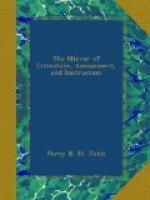M.L.B.
* * * * *
MANNERS & CUSTOMS OF ALL NATIONS.
* * * * *
CHINESE CITIES.
(For the Mirror.)
The cities of China are generally of a square form, surrounded with lofty walls, having projecting towers at regular intervals, and are usually encompassed by a ditch, either dry or full of water. Distributed through the streets and squares, or situated in the vicinity of the principal gates, are round, hexagonal or octagonal towers, of various heights, triumphal arches, beautiful temples dedicated to idols, and monuments erected in honour of those who have rendered important services to the nation, or the people; and lastly some public buildings more remarkable for extent than magnificence.
The squares are large, the streets long and of different breadths, the houses have, for the most part, but a ground floor, and rarely exceed one story. The shops are varnished, and ornamented with silk and porcelain. Before each door is fixed a painted and gilded board, seven or eight feet high, supported on a pedestal, and having inscribed on it three large characters chosen by the merchant for the sign of his shop, to distinguish it from all others. To these are often added a list of the articles to be disposed of, and the name of the seller. Under all, conspicuous for their size, are the characters "Pou-Hou," (no cheating here.)
G.L.S.
* * * * *
FIGS
(For the Mirror.)
Figs have, from the earliest times, been reckoned among the delights of the palate. Shaphan the scribe, who made for the use of the young king Josiah, that compendium of the law of Moses, which is called Deuteronomy, enumerates among the praises of his country, that it was a land of figs.
The Athenians valued figs at least as highly as the Jews. Alexis called figs a “a food for the gods.” Pausanias says, that the Athenian Phytalus was rewarded by Ceres, for his hospitality, with the gift of the first fig tree. Some foreign guest, no doubt, transmitted to him the plant, which he introduced into Attica. It succeeded so well there, that Uthanaeus brings forward Lynceus and Antiphones, vaunting the figs of Attica as the best on earth. Horapollo, or rather his commentator Bolzani, says, that when the master of the house is going a journey, he hangs out a broom of fig boughs for good luck. Our forefathers preferred a broom of birch; as if, in the master’s absence, it was well to remember the rod.
A taste for figs marked the progress of refinement in the Roman empire. In Cato’s time, but six sorts of figs were known; in Pliny’s, twenty-nine. The sexual system of plants, seems first to have been observed in the fig tree; whose artificial impregnation is taught by Pliny, under the name of caprification.




